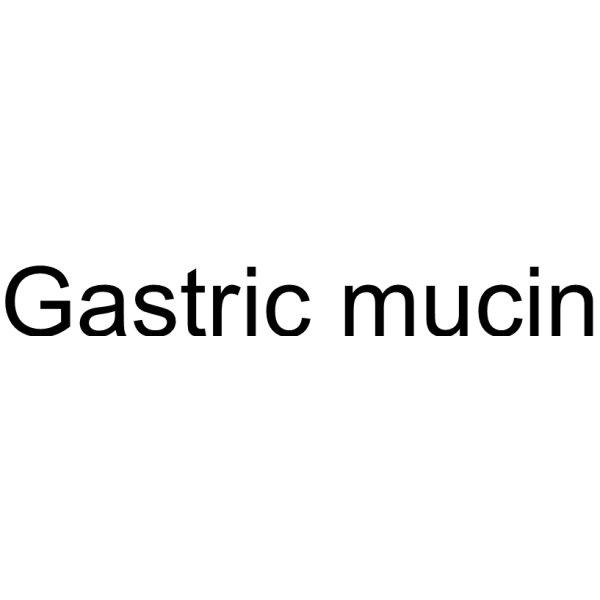产品
编 号:F474968
产品类型
规格
价格
是否有货
500mg
320
In-stock
1g
400
In-stock
结构图

CAS No: 84082-64-4
产品详情
生物活性:
Gastric mucin is a large glycoprotein which is thought to play a major role in the protection of the gastrointestinal tract from acid, proteases, pathogenic microorganisms, and mechanical trauma. In Vitro: Gastric mucin may be integrally involved in the mechanism of gastric mucosal injury caused by Helicobacter pylori leading to gastritis, peptic ulceration, and possibly gastric cancer. Gastric mucins are classified into two types based on their histochemical properties. The first is a surface mucous cell-type mucin, secreted from the surface mucous cells. The second is found in deeper portions of the mucosa and is secreted by gland mucous cells, including mucous neck cells, cardiac gland cells, and pyloric gland cells. The unique O-glycans in gastric mucin appears to function as a natural antibiotic, protecting the host from H. pylori infection. Gastric mucin may provide protection to the surface epithelium gastrointestinal tract by scavenging oxidants produced within the lumen; however, it does so at the expense of its viscoelastic properties. Both native and pronase-treated mucin effectively scavenge hydroxyl radical and that the scavenging properties are not significantly different. The effective concentration of mucin required for a 50% reduction in malondialdehyde production is 10 mg/mL for both native and pronase-treated mucin.
体外研究:
Gastric mucin may be integrally involved in the mechanism of gastric mucosal injury caused by Helicobacter pylori leading to gastritis, peptic ulceration, and possibly gastric cancer. Gastric mucins are classified into two types based on their histochemical properties. The first is a surface mucous cell-type mucin, secreted from the surface mucous cells. The second is found in deeper portions of the mucosa and is secreted by gland mucous cells, including mucous neck cells, cardiac gland cells, and pyloric gland cells. The unique O-glycans in gastric mucin appears to function as a natural antibiotic, protecting the host from H. pylori infection. Gastric mucin may provide protection to the surface epithelium gastrointestinal tract by scavenging oxidants produced within the lumen; however, it does so at the expense of its viscoelastic properties. Both native and pronase-treated mucin effectively scavenge hydroxyl radical and that the scavenging properties are not significantly different. The effective concentration of mucin required for a 50% reduction in malondialdehyde production is 10 mg/mL for both native and pronase-treated mucin.
Gastric mucin is a large glycoprotein which is thought to play a major role in the protection of the gastrointestinal tract from acid, proteases, pathogenic microorganisms, and mechanical trauma. In Vitro: Gastric mucin may be integrally involved in the mechanism of gastric mucosal injury caused by Helicobacter pylori leading to gastritis, peptic ulceration, and possibly gastric cancer. Gastric mucins are classified into two types based on their histochemical properties. The first is a surface mucous cell-type mucin, secreted from the surface mucous cells. The second is found in deeper portions of the mucosa and is secreted by gland mucous cells, including mucous neck cells, cardiac gland cells, and pyloric gland cells. The unique O-glycans in gastric mucin appears to function as a natural antibiotic, protecting the host from H. pylori infection. Gastric mucin may provide protection to the surface epithelium gastrointestinal tract by scavenging oxidants produced within the lumen; however, it does so at the expense of its viscoelastic properties. Both native and pronase-treated mucin effectively scavenge hydroxyl radical and that the scavenging properties are not significantly different. The effective concentration of mucin required for a 50% reduction in malondialdehyde production is 10 mg/mL for both native and pronase-treated mucin.
体外研究:
Gastric mucin may be integrally involved in the mechanism of gastric mucosal injury caused by Helicobacter pylori leading to gastritis, peptic ulceration, and possibly gastric cancer. Gastric mucins are classified into two types based on their histochemical properties. The first is a surface mucous cell-type mucin, secreted from the surface mucous cells. The second is found in deeper portions of the mucosa and is secreted by gland mucous cells, including mucous neck cells, cardiac gland cells, and pyloric gland cells. The unique O-glycans in gastric mucin appears to function as a natural antibiotic, protecting the host from H. pylori infection. Gastric mucin may provide protection to the surface epithelium gastrointestinal tract by scavenging oxidants produced within the lumen; however, it does so at the expense of its viscoelastic properties. Both native and pronase-treated mucin effectively scavenge hydroxyl radical and that the scavenging properties are not significantly different. The effective concentration of mucin required for a 50% reduction in malondialdehyde production is 10 mg/mL for both native and pronase-treated mucin.
产品资料

